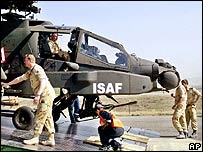
Dutch troops have been in Kabul as part of the international force
|
The Netherlands will send an extra 1,400 troops to southern Afghanistan, after parliament ended six months of wrangling to approve the deployment.
Despite opposition from one of three parties in the ruling coalition, most MPs supported the plan, including those from the main opposition Labour party.
Nato, the UN and US have been urging the Netherlands to send the extra troops to bolster peacekeeping work.
Polls show that Dutch public opinion is almost equally divided on the issue.
Many Dutch MPs had demanded assurances that the country's troops would not have to work under US forces in Afghanistan.
Democrats-66, the smallest party in the coalition government, opposed the plan on the grounds that the Dutch forces would inherit hostility generated by a "failed" US mission in the region.
The existing Dutch contingent in Afghanistan, numbering just over 600 soldiers, operates under Nato command and is based in the capital, Kabul.
The new troops will be sent to the southern province of Uruzgan, where foreign soldiers have frequently clashed with militants linked to the ousted Taleban regime.
Srebrenica record
They will join the Nato-led International Security Assistance
Force (Isaf), consisting of about 10,000 soldiers from more than
30 countries.
Isaf focuses on stabilisation and reconstruction, while a separate US force is engaged in rooting out Taleban and al-Qaeda fighters.
Thursday night's debate over the deployment was often emotional, the BBC's Geraldine Coughlan reports from the Hague.
MPs were shown confidential intelligence information on the safety of Dutch soldiers during the 10-hour parliamentary session.
The main opposition Labour party announced earlier this week that it would support the plan.
"This mission has a chance to succeed. It will be hard, slow-going, and there will be setbacks," the Labour leader Wouter Bos said.
Defence Minister Henk Kamp is quoted by the Associated Press news agency as saying that an advance deployment of 900 soldiers will be sent to Uruzgan in early March.
"It's a dangerous mission, the most dangerous mission since Srebrenica," he said, referring to the town in Bosnia-Hercegovina where Dutch peacekeepers failed to prevent the massacre of thousands of Muslims by Serb forces 10 years ago.
The Dutch record in Srebrenica was cited by many of those opposed to sending more troops to Afghanistan, our correspondent says.

